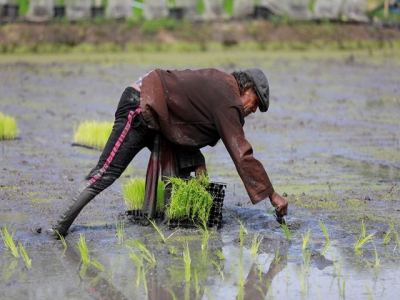Asia Rice-Firm rupee lifts Indian rates; Vietnam prices hold near 12-year low

BENGALURU, Sept 20 - Indian rice export prices rose this week on a resurgent rupee, while sluggish demand kept Vietnamese rates near a 12-year low even as the country looks to encourage private investment to make its rice more competitive.
A worker cultivates rice plants at Sompot Tubcharoen's farm in Bangkok, Thailand August 28, 2018. Photo: Reuters
Top exporter India’s 5% broken parboiled variety RI-INBKN5-P1 rose to around $373-$379 per tonne from $370-$376 a week ago, despite faltering demand from African countries.
The rupee on Thursday moved further away from a near two-week low touched earlier in the week.
Buying from west African countries, especially from key buyer Benin, has been faltering, said Nitin Gupta, vice president for Olam India’s rice business.
Meanwhile, Vietnam’s 5% broken rice RI-VNBKN5-P1 rates were unchanged at $325 per tonne, their lowest since November 2007, as “trading activity remains subdued on weaker demand,” a Ho Chi Minh City based trader said.
A lack of fresh deals has squeezed the Vietnamese market, with prices now about 13% lower than at the beginning of the year.
The country is seeking to encourage private investment in modernising local rice processing and storage facilities in order to raise competitiveness, state media reported on Thursday, citing an official with the Ministry of Agriculture and Rural Development.
Prices for second-biggest exporter Thailand’s benchmark 5% broken rice RI-THBKN5-P1 were also unchanged at $400-$418 a tonne on lack of demand and little fluctuation in the exchange rate between the baht and U.S. dollar.
At an average of $409, Thai rice was still near its highest since June 2018.
Demand remains flat as higher prices have deterred buyers, traders said. A strong baht has kept rates elevated compared with competitors since the start of the year.
However, concerns over supply persist due to ongoing floods in northeastern Thailand, along with estimated damage to more than 240,000 hectares of agricultural land from floods caused by tropical storm Podul.
“At the moment there are no immediate concerns over supply but we will have to see how much the flood will impact rice supply towards the end of the year,” a Bangkok-based trader said.
Bangladesh, also recovering from a devastating flood, is contemplating whether to introduce newer rice varieties and technology to try to reduce production costs and boost domestic output, Agriculture Minister Abdur Razzaque said.
Dhaka has been unable to clinch overseas deals since a long-standing export ban was lifted in May, with its rice more expensive than India’s or Thailand’s, despite a recent fall in local prices.
Có thể bạn quan tâm
 Revenue from pepper exports to Germany soar despite falling prices
Revenue from pepper exports to Germany soar despite falling prices Though Vietnam’s revenue from pepper exports experienced drops in most foreign markets, those to Germany soared during the first seven months of 2019
 Agriculture, fishery to China: Need to accept requirements
Agriculture, fishery to China: Need to accept requirements The Chinese market is becoming increasingly picky, tightening requirements and conditions on imported agricultural and fishery products
 Vietnam coffee prices unchanged; Indonesian premium widens
Vietnam coffee prices unchanged; Indonesian premium widens Vietnam’s domestic coffee prices were unchanged on Thursday from a week earlier as trade has almost come to a halt ahead of a major harvest beginning next month